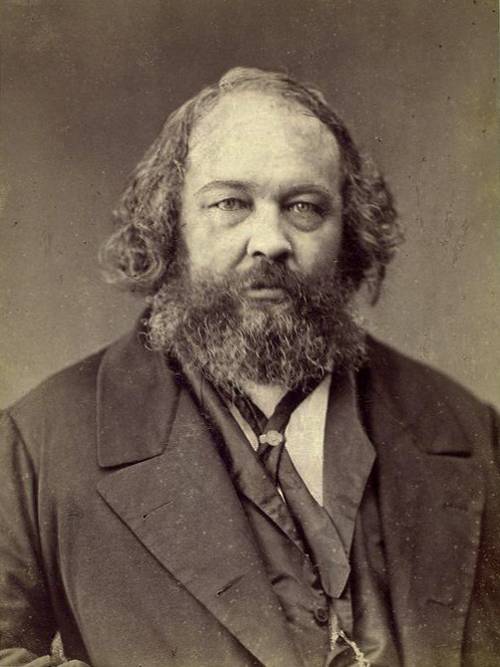
FAQ About Mikhail Bakunin

Who was Mikhail Bakunin?
Mikhail Bakunin was a Russian revolutionary and philosopher, often recognized as one of the most influential figures in the development of anarchist philosophy. Born in 1814, Bakunin became a major proponent of collectivist anarchism, advocating for the abolition of both the state and private property in favor of cooperative ownership and egalitarianism. His works and actions greatly contributed to the theoretical foundations of modern anarchism.

What are the key ideas of Bakunin's anarchism?
Bakunin's anarchism centered around the concepts of freedom, federalism, and anti-authoritarianism. He believed that true freedom is achieved not through political rights within a state but by abolishing unjust hierarchies entirely. Bakunin rejected all forms of coercive authority, including the state, religion, and capitalism, advocating for societies organized through voluntary associations and federations of workers.

How did Bakunin influence the anarchist movement?
Bakunin's influence on the anarchist movement is profound, shaping its principles and practices. He articulated theories of collective freedom, direct action, and the revolutionary potential of the working class, emphasizing the need for autonomous worker communities to resist oppressive structures. His clashes with Marx, particularly over the role of the state in socialism, helped delineate anarchism from Marxism, establishing a distinct ideological branch of anti-authoritarian socialism.

What was the relationship between Bakunin and Marx?
Mikhail Bakunin and Karl Marx shared the goal of overthrowing capitalism and achieving socialism, but their ideological differences led to a significant rivalry. Bakunin criticized Marx's approach for its perceived authoritarian tendencies, particularly the emphasis on a transitional state-led dictatorship of the proletariat. Their disagreements culminated in Bakunin's expulsion from the First International, highlighting the split between socialist and anarchist schools of thought.

What are some major works written by Mikhail Bakunin?
Mikhail Bakunin's major works include "God and the State," where he criticizes religion and the concept of divine authority, and "Statism and Anarchy," in which he presents his opposition to Marx's ideas and advocates for a stateless society. Although not all of Bakunin's works were systematically organized, his correspondence and manuscripts have been integral in shaping anarchistic debates and philosophy.

How did Mikhail Bakunin's early life shape his political views?
Bakunin's early life in an aristocratic family in Russia exposed him to both privilege and the intense restrictions of Tsarist autocracy. His studies in philosophy inspired a passion for freedom and justice, leading him to critique authority and champion egalitarian ideals. These formative experiences, coupled with his exposure to radical ideas across Europe, significantly influenced his development into an anarchist philosopher.

What was the significance of Bakunin's involvement in the 1848 revolutions?
Mikhail Bakunin's participation in the 1848 revolutions was pivotal in solidifying his commitment to revolutionary action and anti-authoritarianism. He supported the uprisings across Europe against autocratic rule and was actively involved in street fighting and political strategy. These experiences reinforced his belief in the necessity of direct action and the potential for popular movements to transform society.

How did Bakunin view religion and its role in society?
Bakunin vehemently opposed organized religion, viewing it as a tool of oppression that supported the status quo. In his work "God and the State," he argued that the concept of divine authority reinforced subservience and undermined human freedom. Bakunin advocated for atheism and secularism, promoting the idea that society should be free from religious influence to achieve genuine independence and equality.

What were Bakunin's views on nationalism?
Bakunin had a complex view of nationalism. While he supported national liberation movements against imperialist and oppressive regimes, he feared that nationalism could be co-opted by the bourgeoisie to suppress class struggle. He advocated for a form of inclusive nationalism aligned with internationalism, emphasizing solidarity among all oppressed people as part of a broader revolutionary struggle for freedom.

Did Bakunin write any criticisms of other socialist ideologies?
Yes, Bakunin wrote extensive critiques of various socialist ideologies, most notably Marxism. He opposed Marx's conception of a transitional state and argued that any form of centralized authority, even if claimed to be temporary, would perpetuate oppression and hinder true liberation. Bakunin's critiques of Marxism focused on promoting a decentralized, stateless approach to achieving socialism.

How does Bakunin's idea of collectivism differ from other forms of socialist thought?
Bakunin's idea of collectivism diverges from other socialist thoughts primarily through its rejection of state control. Unlike state-centric socialisms, Bakunin's collectivism advocates for workers' self-management and cooperative ownership of resources without overarching state oversight. He emphasized direct participation and federative organization as opposed to centralized planning, which he believed would lead to new forms of tyranny.

Why is Bakunin considered a foundational figure in anarchism?
Bakunin is considered a foundational figure in anarchism due to his comprehensive critique of political and religious authority and his development of alternative models of social organization. His theories on dismantling power hierarchies and establishing free federations of producers directly impacted the trajectory of anarchist movements worldwide. His bold challenge to Marxism also helped distinguish anarchism as a unique ideological path within leftist politics.

What events led to Bakunin's expulsion from the First International?
The expulsion of Bakunin from the First International in 1872 stemmed from deep ideological and personal conflicts with Karl Marx and his followers. Bakunin's anarchist ideology, which called for immediate abolition of the state and skepticism of centralized political authority, clashed with Marx's strategies that involved a potential transitional socialist state. The conflicts reached a peak during the First International's Hague Congress, resulting in Bakunin's expulsion.

How did Bakunin's ideas influence later anarchist movements?
Bakunin's revolutionary ideas, particularly his advocacy for direct action and federalism, significantly influenced later anarchist movements. His emphasis on autonomy and rejection of hierarchies became core tenets of anarcho-communism and anarcho-syndicalism. Future anarchists adopted his tactics of mass organization and decentralized cooperation, employing these ideas in various social struggles and organizational frameworks.

What role did Bakunin play in the development of anarchist theory?
Bakunin was instrumental in the development of anarchist theory by providing both a philosophical and practical foundation for the movement. His writings stressed the need for a stateless society based on voluntary cooperation and federalism. Bakunin's commitment to revolutionary praxis over purely theoretical approaches also left a lasting impact, encouraging anarchists to pursue direct and collective action against oppressive structures.

How was Bakunin's personal life intertwined with his political activities?
Mikhail Bakunin's personal life was deeply entwined with his political activities as his social and ideological beliefs guided his interactions and relationships. He engaged with various revolutionary and intellectual circles throughout Europe, often living in exile due to his political activism. Despite personal hardships, including financial instability and imprisonment, Bakunin maintained steadfast dedication to his anarchist principles and revolutionary goals.

What is Bakunin's legacy in modern political thought?
Bakunin's legacy in modern political thought is reflected in the enduring influence of anarchist principles such as anti-authoritarianism, decentralization, and collective ownership. Contemporary movements advocating for horizontal organization, social justice, and environmental ethics often draw inspiration from Bakunin's vision of a stateless, cooperative society. His critiques of power dynamics remain relevant, continuing to inspire discussions and actions against oppression.

What were Bakunin's connections to other notable 19th-century revolutionaries?
Bakunin was connected to many notable 19th-century revolutionaries and intellectuals, including Karl Marx, whom he opposed ideologically, and Pierre-Joseph Proudhon, a fellow anarchist. His extensive travels and involvement in revolutionary activities facilitated interactions with diverse political circles, influencing his thoughts and strategies. These connections often provided platforms for him to disseminate his ideas and recruit allies in his anarchist causes.

How did Bakunin's imprisonment affect his views and writings?
Bakunin's imprisonment, particularly his years in the Peter and Paul Fortress and later in Siberian exile, profoundly affected his views and writings. The harsh conditions reinforced his disdain for authoritarianism and deepened his commitment to revolutionary change. During this time, he reflected on and developed his anarchist ideology, producing critical works that emphasized the need to resist oppressive institutions and envision a liberated society.

What was Bakunin's stance on capitalism and private property?
Bakunin was staunchly opposed to capitalism and private property, which he saw as sources of inequality and oppression. He argued that capitalism's inherent hierarchies and exploitation of labor are antithetical to freedom. To achieve social justice and equality, Bakunin advocated for the abolition of private property and the establishment of collective ownership systems, where resources would be shared based on need and managed cooperatively.
